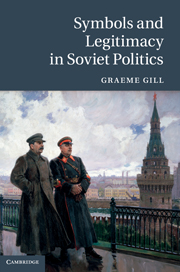5 - The vision implodes, 1985–1991
Published online by Cambridge University Press: 11 April 2011
Summary
By the time Gorbachev came to power in March 1985, the metanarrative was under considerable strain as a result of the post-Stalin changes and the danger of incoherence they introduced. The tying of communism overwhelmingly to the achievement of material abundance had desacralised that aim, while its association with a specific timetable (despite the attempts under Brezhnev to blur this) created a benchmark that people could use to judge the lack of progress towards it. The overshadowing of the myth of October by that of the Great Patriotic War and the projection of leadership in terms of effective administration, with the consequent rejection of charisma as a basis of authority, transformed the metanarrative into a conservative, even mundane and humdrum, discourse. The difficult economic circumstances that became apparent in the 1970s and the acknowledged growth of corruption at this time created a situation that seemed to be favourable for the articulation of new ideals and the introduction of changes to the system. But while there was widespread acceptance that some form of change was necessary both practically and morally (i.e. in the sphere of ideas, ideals and symbols), there was no agreement on either the nature or extent of such changes. Furthermore, although there was a potentially wide constituency that would have favoured change, this was not universal. Among many office-holders there was concern that change could have serious consequences for them personally, with the result that they were willing to act as a brake on change and, because of their strategic location in the political structure, they remained a significant influence on how both the course of policy and the discourse of symbols in the metanarrative unrolled.
- Type
- Chapter
- Information
- Symbols and Legitimacy in Soviet Politics , pp. 213 - 263Publisher: Cambridge University PressPrint publication year: 2011



